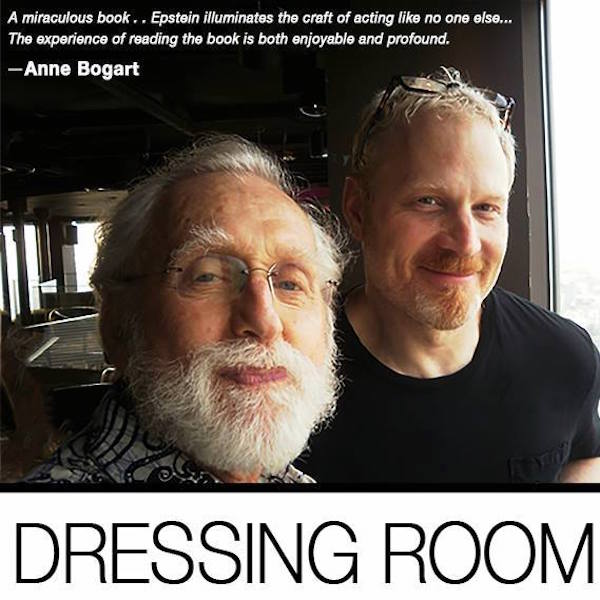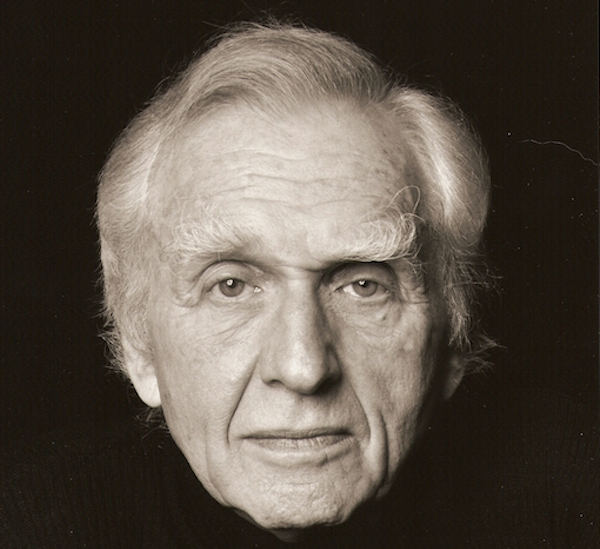Book Review: Alvin Epstein’s “Dressing Room Stories” — Vivid Theater History
Alvin Epstein’s recollections about his decades as a stage performer have been gathered in the form of tales about what happened behind the scenes, and published in a charming, small book.
Dressing Room Stories: The making of an artist by Alvin Epstein and Jonathan Fried. Available on Amazon.com, 149 pages, $15.

By Iris Fanger
If only there were an award such as National Treasure for an American artist — Alvin Epstein would top the list. Soon to celebrate his 91st birthday, and living in Weston, MA, Epstein was an influential figure in the Boston/Cambridge theatrical world for more than two decades after his arrival at American Repertory Theater in 1980, but he was equally lauded for his achievements on a wider stage, pardon the pun. Actor, director, teacher, and mentor, Epstein has been at the epicenter of ground-breaking theater since the late 1940s, as a student of Martha Graham and Etienne Decroux, an adoring acolyte of Edward Gordon Craig, friend and stage partner to Marcel Marceau, and creator of roles in landmark plays by Samuel Beckett. From Paris to New York, including three seasons in Israel as an actor and mime teacher with the then-young country’s Habimah Theater (1951-1954), Epstein is a living exemplar of the international reach of mid-20th century theater and beyond.
His recollections now have been gathered in the form of tales about what happened behind the scenes, and published in a charming, small book entitled Dressing Room Stories: The making of an artist by his confidant and fellow actor, Jonathan Fried. The volume is the outcome of years of story-telling by Epstein, who often entertained his younger colleague with anecdotes recalled from the past.
The pair met in 1991, when both were cast in the A.R.T. production of King Lear, Epstein as Gloucester and Fried as his son, Edmund. By then, Epstein had been a member of the Cambridge-based company for a decade, following Robert Brustein to Harvard from New Haven where the actor had been a founding member of the Yale Repertory Theater and the Yale School of Drama. Epstein remained at Harvard from 1980 to 2004, with some interruptions for various assignments that included serving as artistic director at the Guthrie Theater in Minneapolis.
Fried and Epstein worked together again in 2009, during the second season of the Bridge Project, a co-production of Brooklyn Academy of Music and the Old Vic in London, directed by Sam Mendes and Kevin Spacey. Half-British and half-American, the company of 16 actors performed As You Like It (Epstein cast as Old Adam) and The Tempest (Epstein as Gonzalo) at BAM, toured for six months abroad, went to London, then continued to Spain before closing down. Epstein was 85 years old at the time, but managed to fulfill the year-long commitment, half on the road. Fried recalls in his introduction that it was on this tour that Epstein finally agreed to record the stories which make up the greater part of the book.
Born in the Bronx in 1925, Epstein was the son of a Jewish doctor who, according to the actor, was “a great lover of Yiddish literature and Russian poetry, and above all, Beethoven Beethoven, Beethoven.” In addition to the music, as a child Epstein loved beautiful art and was always “doodling and drawing.” But rather than accepting a scholarship to the Art Students League, he chose a career in the theater. He formed an obsession with Craig when a friend gave him the visionary’s book The Theater—Advancing for an 18th birthday gift. Epstein came to Paris after serving in World War II and through a weird coincidence met his master, who befriended the young soldier. “Here I am on my second day in Paris, sitting in Craig’s home having dinner with him. Things like this have happened over and over,” Epstein comments.
Epstein’s break-out year occurred after his return to New York in the fall of 1955. He had studied mime in Paris with Decroux, performed in France with Marceau, and worked in Israel, but decided he wanted to continue his career at home. Within a few weeks he had been hired to assist his friend, Marceau, at the off-Broadway Phoenix Theater and on the show’s national tour. Back in New York for less than a month, he was hired to play the Fool in Orson Welles’ ill-fated production of King Lear. Herbert Berghof saw Epstein in the role and hired him to play Lucky in the American premiere of Beckett’s Waiting for Godot. “At the time I did not realize how unusual this all was. I’m amazed at it now,” Epstein confesses. His experiences in Godot comprise eight chapters, arguably the most memorable portion of Dressing Room Stories.
As a veteran member of the A.R.T. audience since its first season, I cherish the memorable evenings forged by Epstein, starting in 1980 with the muscular, visually arresting production of A Midsummer Night’s Dream which he directed. For this viewer, however, the high point came with a Waiting for Godot (1995) that paired Epstein as Estragon opposite his friend and colleague, the late, great Jeremy Geidt, as Vladimir. Director David Wheeler cast them as two forgotten men of a certain age on a bleak landscape with no choice other than to wait — a resonate image of how time passes as the life cycle winds down. Unhappily, none of Epstein’s memories from A.R.T. are included in the book. In a recent telephone conversation, Brustein recalled, “Alvin was a great master of mime. It set him apart as an actor; it gave him a particular grace.”

Veteran actor Alvin Epstein — We should be grateful for having him on record about his early years in the theater.
The parallels in Epstein’s career kept coming. He started his career in 1956 on Broadway as Lucky in Waiting for Godot, and then advanced to Estragon nearly 40 years later. So it was with King Lear. Epstein played the title role in 2006 for Actors’ Shakespeare Project in Boston, a production that moved to La Mama in New York where it earned him critical acclaim. The book jumps from Epstein’s roles in four different productions of Beckett’s Endgame, followed by a brief chapter on teaching acting to Meryl Streep at Yale and a section on 2006’s King Lear.
While we should be grateful for having Epstein on record about his early years in the theater, when he was so closely involved with so many starry names, this volume whets our appetite for a more expansive look about his career, one that would place him in context with the important events and artists he encountered. Besides missing his impressions of the Harvard years, it would have been good to have fuller accounts of other times and people in his life, especially his relationship to the works of Samuel Beckett and reflections on their introduction to the United States. Moreover, Epstein was among the key players in the development of Off-Broadway and the growth of the regional theaters beyond New York. His impressive accomplishments are worthy of a far more complete assessment, and should be amplified by research and commentary from his colleagues, former students, and observers.
Note: A public book reading/ signing featuring Epstein and Fried will be held at American Repertory Theater at the Loeb Drama Center, Cambridge, MA at 6 p.m. on Monday, June 13.
Iris Fanger is a theater and dance critic based in Boston. She has written reviews and feature articles for the Boston Herald, Boston Phoenix, Christian Science Monitor, New York Times, and Patriot Ledger as well as for Dance Magazine and Dancing Times (London).
Former director of the Harvard Summer Dance Center, 1977-1995, she has taught at Lesley Graduate School and Tufts University, as well as Harvard and M.I.T. She received the 2005 Dance Champion Award from the Boston Dance Alliance and in 2008, the Outstanding Career Achievement Award from the Graduate School of Arts and Sciences at Tufts. She lectures widely on dance and theater history.

I interviewed Epstein, and several others of the company, for a documentary years ago (http://www.imdb.com/title/tt0810794/) He was charming, full of life, wit, and stories. As a decades-long ART audience member, I’m so glad to know about this book, which escaped my radar.
Alvin Epstein is one of my favorite people. I knew him at Yale. He was a man of uncommon intelligence, humility, humor and kindness. Superb human being. Just learned of his passing today. I feel the loss in my best heart.